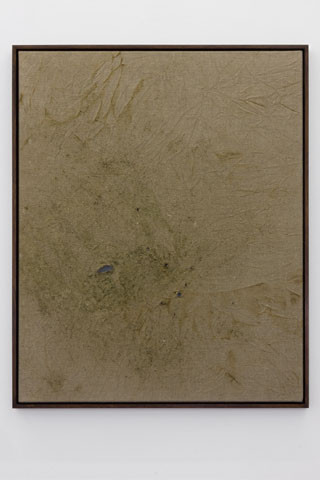Davide Balula
27 Feb - 23 Mar 2010

© Davide Balula
View of the exhibition Le compas dans l'oeil
Galerie frank elbaz, Paris, from February 27th to March 23th, 2010
View of the exhibition Le compas dans l'oeil
Galerie frank elbaz, Paris, from February 27th to March 23th, 2010
DAVIDE BALULA
“A Compass In the Eye”
Exhibition from February 27 to March 23rd, 2010 Tuesday-Saturday 11am-7pm
Opening on Saturday, February 27th
Davide Balula’s Compass In the Eye seems to evoke both a pupil’s mischief gone wrong as well as the artist’s ability to work without the measuring tool. Instead of geometric shapes and accurate proportions though, Balula compasses here literally the material traces of a Heraclitean reality: halfway between protophysics and abstract expressionism, the artist establishes an assisted topography of chance where, based on pre-determined conventions and protocols, the artistic intention combines itself with the contingency of the world. Hence, his River Paintings (2009-2010) depict on re-cropped canvases the random deposit of alluvia sampled in the Seine river (Paris), the East River (New York) or the Douro (Portugal); Mold Painting (2009) stages the oblique itinerary of artificially grown mildew; The Burnt Painting (Portrait) (2010) exposes the unforeseeable irregularities of a wooden surface consumed by fire; finally, Accelerated Aging of Blue Paper (2010), terror of the shrewd conservator, anticipate the effects of natural decay of the chromatic pigments...all these organic abstractions embodying the active collaborations of the amused artist with the irresistible forces of entropy, this law of thermo-dynamics that states the increasing disorder of the systemworld.
While for the first time in Balula’s formal course all works presented here investigate flatness, they relate truly to photography and its inherent gestures – from the image development (the parasite mushrooms, oxidation of the ink), the cropping of the chosen composition (the unconscious motifs of the fluvial sediments), to the constitution of a negative (Imprint of The Burnt Painting (Portrait) (2010)) – as much as to painting or drawing and their essential faktura. The object of representation, rather than composed from scratch, turns out a fortunate finding, seized at the right moment in the ceaseless flux of natural forms.
Voluntarily one-eyed views, the vestiges of Balula’s eye (this same eye that artists are said to have) extend their sight to what conventionally stands off-frame; or rather, the ambivalent indetermination placed at the core of vision includes in its socket the concrete process of his creations: the medium reduced to its most rudimentary state, i.e. the mere physical support such as countertop, or a cardboard desk blotter (Untitled, 2010), bearing the accidental residue of the artist’s pieces, in turn becomes a piece itself. In an intriguing dialectic of presence-absence, the diverse incidents (stains, cuts, colorations), performative markers of these “works not showed” (do they actually exist?) form the archives in absentia of this art of ordered dislocation.
The French idiom "avoir un compas dans l'oeil," literally, "to have a compass in the eye" refers to one's ability, without the help of the instrument, to correctly assess measurements and distances.
Béatrice Gross
“A Compass In the Eye”
Exhibition from February 27 to March 23rd, 2010 Tuesday-Saturday 11am-7pm
Opening on Saturday, February 27th
Davide Balula’s Compass In the Eye seems to evoke both a pupil’s mischief gone wrong as well as the artist’s ability to work without the measuring tool. Instead of geometric shapes and accurate proportions though, Balula compasses here literally the material traces of a Heraclitean reality: halfway between protophysics and abstract expressionism, the artist establishes an assisted topography of chance where, based on pre-determined conventions and protocols, the artistic intention combines itself with the contingency of the world. Hence, his River Paintings (2009-2010) depict on re-cropped canvases the random deposit of alluvia sampled in the Seine river (Paris), the East River (New York) or the Douro (Portugal); Mold Painting (2009) stages the oblique itinerary of artificially grown mildew; The Burnt Painting (Portrait) (2010) exposes the unforeseeable irregularities of a wooden surface consumed by fire; finally, Accelerated Aging of Blue Paper (2010), terror of the shrewd conservator, anticipate the effects of natural decay of the chromatic pigments...all these organic abstractions embodying the active collaborations of the amused artist with the irresistible forces of entropy, this law of thermo-dynamics that states the increasing disorder of the systemworld.
While for the first time in Balula’s formal course all works presented here investigate flatness, they relate truly to photography and its inherent gestures – from the image development (the parasite mushrooms, oxidation of the ink), the cropping of the chosen composition (the unconscious motifs of the fluvial sediments), to the constitution of a negative (Imprint of The Burnt Painting (Portrait) (2010)) – as much as to painting or drawing and their essential faktura. The object of representation, rather than composed from scratch, turns out a fortunate finding, seized at the right moment in the ceaseless flux of natural forms.
Voluntarily one-eyed views, the vestiges of Balula’s eye (this same eye that artists are said to have) extend their sight to what conventionally stands off-frame; or rather, the ambivalent indetermination placed at the core of vision includes in its socket the concrete process of his creations: the medium reduced to its most rudimentary state, i.e. the mere physical support such as countertop, or a cardboard desk blotter (Untitled, 2010), bearing the accidental residue of the artist’s pieces, in turn becomes a piece itself. In an intriguing dialectic of presence-absence, the diverse incidents (stains, cuts, colorations), performative markers of these “works not showed” (do they actually exist?) form the archives in absentia of this art of ordered dislocation.
The French idiom "avoir un compas dans l'oeil," literally, "to have a compass in the eye" refers to one's ability, without the help of the instrument, to correctly assess measurements and distances.
Béatrice Gross
